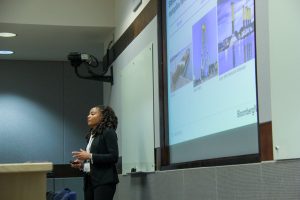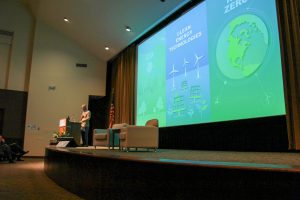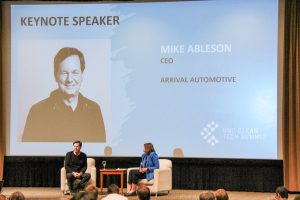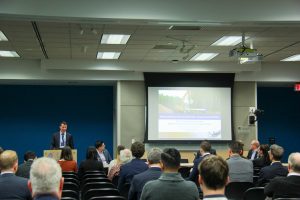Transitioning to a Low Carbon Economy—UNC’s eighth annual Clean Tech Summit advocates for economic and environmental advancement
April 29, 2022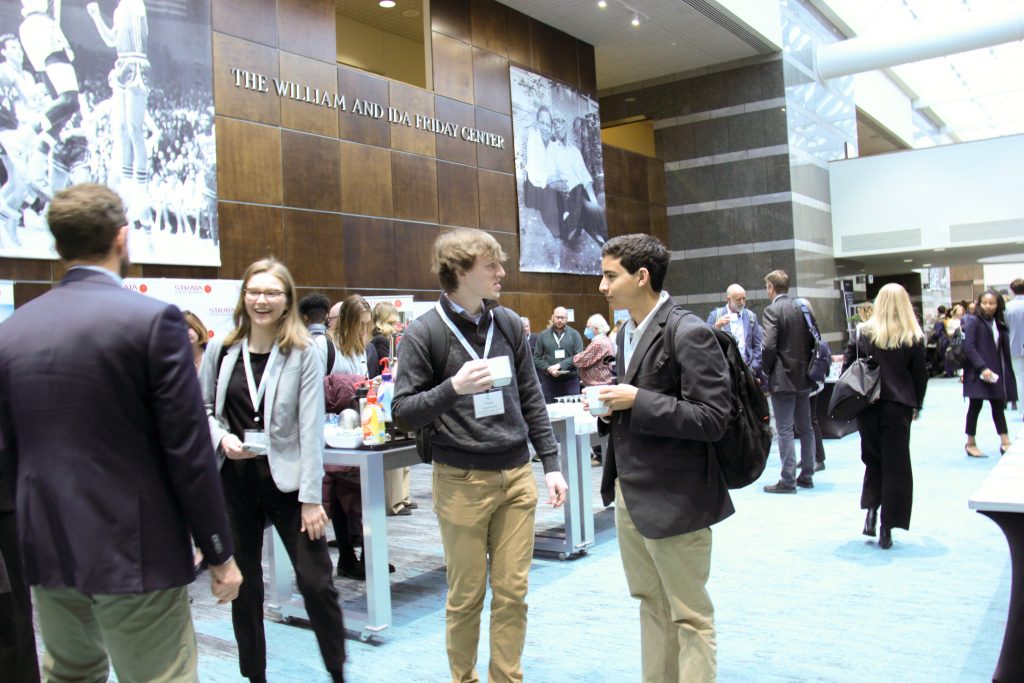
The UNC Cleantech Summit took place in person on March 29-30, drawing more than 800 industry leaders, students, and policymakers from across the Southeast to Chapel Hill, North Carolina. This year’s theme, “Transitioning to a Low Carbon Economy,” gave attendees from around the world the opportunity to examine strategies to limit emissions by adapting and developing technology and policy. The event is co-sponsored by the UNC Institute for the Environment and the Kenan-Flagler Business School’s Center for Sustainable Enterprise.
Greg Gangi, IE’s associate director for clean technology and innovation, along with Kiersten Williams, a public communications specialist, organized the event with the help of student volunteers.
“We had a lot of great participation from the industry this year and a lot of high-level speakers,” said Gangi. “There’s a growing interest for our event; not just in Europe, but in Asia as well.”
Throughout the two days, the Summit featured keynote speakers and utilized smaller sessions to allow attendees to explore their areas of interest. Between keynote addresses, there were breaks to network and connect with others, as well as panel sessions from the seven tracks of the event.
These seven tracks supplementing the overarching theme featured panelists from various locations and career paths. Each day, sessions met that explored: Green Hydrogen for a Carbon-Free Economy; Ocean-Centric Climate Solutions; The Global Energy Transition; Green Finance: Investing in Our Future; Weaving a Sustainable Future Through Textile Innovations; and The Rise of Alternative Proteins, and Mobility.
Sixteen keynotes and featured speakers gave presentations throughout the event. The Summit began with Phil Berger, president pro tempore of the North Carolina Senate, providing a welcome address.
The conference’s first keynote speech was Glenn Wright, vice president for renewable and energy solutions, of Shell Energy Americas. Wright spoke about the process of shifting Shell Energy, a company that historically relies on fossil fuels, into the clean technology space.
When discussing Shell Energy’s consumer base as the company faces the challenges of transitioning in the energy sector, Wright said, “They relied on us in the past; we want them to rely on us now.”
Among the keynote addresses on day two, Paul Rennie, head of the global economy group for the British Embassy in Washington, D.C., spoke about how to move forward after the 2021 United Nations Climate Change Conference. He discussed strategies to navigate climate change from an economic perspective and how to progress as a global community. Rennie also emphasized that the young people and students he has interacted with indicate that there is a bright future for the world despite the climate-related challenges ahead.
Similar themes emerged from the panel sessions. Despite each session’s varying topics, many panelists emphasized the need to include middle- and lower-class perspectives in the energy transition. Panelists also discussed affordable and realistic advancement strategies for subjects ranging from textiles, public transportation, and supply chains. Several panels also discussed offshore wind, both domestically and internationally.
With ambitious climate goals and targets to phase out coal and combustion engine cars, Europe’s energy transition was another theme that emerged on Day 2 of the Summit. Momentum toward these goals of many European countries has been complicated due to the war in Ukraine. Leaders in European countries discussed paths forward and are exploring new ways to reach their climate goals.
“The war in Ukraine just connected climate and national security policy in Europe,” said Gangi. “European countries now equate payments to Russia for oil and gas as blood money. The war in Ukraine will lead to a temporary uptick in greenhouse gas emissions coming from the EU, but it will also accelerate their move to net zero carbon economies. Some countries, in the near term, will be switching back to coal rather than using Russian natural gas.”
Apart from speakers, the Summit also included many opportunities for students in attendance. Students were able to sign up for a solar decathlon workshop hosted as a webinar on March 28 by the U.S. Department of Energy. Those who signed up also participated in the Mentor Match Program, matching a student with a professional. Each pair met at some point during the event, allowing time for the student to ask questions about their interests and career goals. After the Summit concluded, students also could attend a virtual career fair co-hosted by the Center for Sustainable Enterprise.
The Summit provided opportunities to connect with companies and organizations that sponsored the event. Sponsors hosted tables in the atrium area to speak with students and other interested attendees. The Women in Clean Energy Reception occurred on the evening of March 29 and allowed women in the industry to network with one another. Each day, there was a vegan lunch for those at the event, which allowed participants to interact as well.
Speaking about students’ involvement at the Summit, Gangi said: “The students who did invest in the event came out with great opportunities and connections. We’re on a lot of people’s radars.”
More 2022 UNC Cleantech Summit Headlines:
-
In UNC address, Shell executive outlines path from oil and gas to renewable energy (The News & Observer | Mar. 30, 2022)
-
Arrival will make its first electric delivery van at a Charlotte factory in late 2022 (MSN | News & Observer | Mar. 30, 2022)
- Fox touts Champion Sustainability Fund in keynote address at UNC Cleantech Summit (Sustainable Carolina | Apr. 6, 2022)
Story and photography by Sarah Padyk
This semester, Sarah Padyk is working as an environmental communications intern. As an environment and science communication dual degree student, Sarah is working towards a B.S. in environmental science and an M.A. in media and communication. She originally got involved with IE as a Cleantech Corner intern, and she recently interned with The Nature Conservancy in North Carolina. After graduating with her master’s degree in 2023, Sarah plans to pursue a career in environmental communication with a focus on energy systems.

